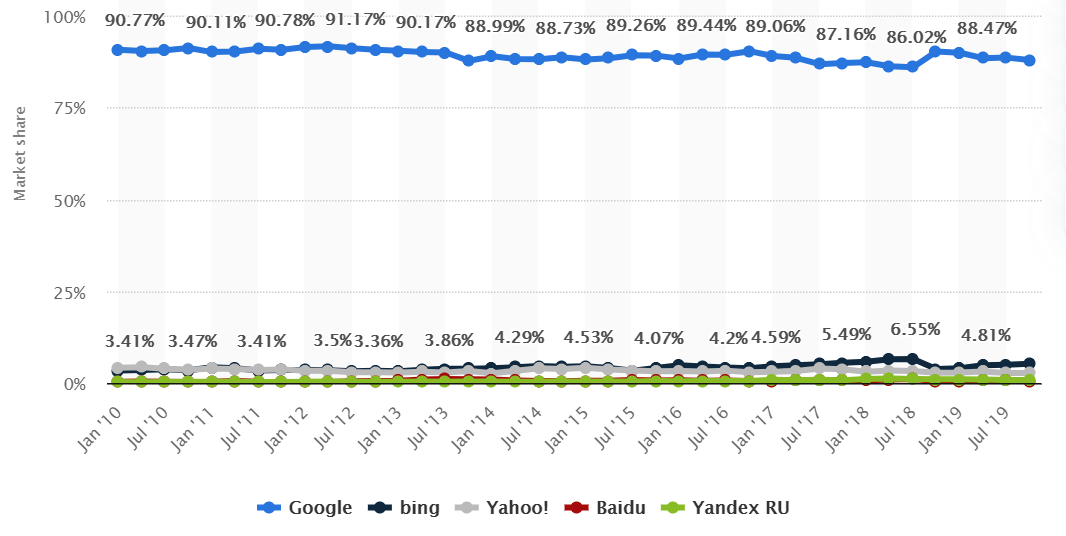It’s that time of year again. We’re going to reflect on what we’ve learned this year (and because it’s 2019, this decade). Then we’re going to lay down our predictions for the state of the digital marketing industry in 2020 and beyond.
Looking back on our predictions for 2019, we think we did quite well.
Let’s see how this year’s predictions fare.
Google as the end destination
Have you noticed that more and more Google searches give you the information you need right there in the SERPs, rather than directing you to other websites?
This is no accident.
Not only does keeping people within the Google ecosystem provide a more seamless search experience, but it also increases the number of impressions on Google ads.
For SEOs, Google being the end destination of an increasing amount of searches will mean spending more time on figuring out which searches are likely to bring clicks. Then, it will mean spending more time optimising for those.
Special Search Results
Piggybacking off of the above, we predict increased emphasis on special search results and featured snippets in SEO strategies.
Featured snippets for SEO isn’t a new technique, but it’s common in SEO to see things gain traction over many years. Webmasters will continue to be incentivised as snippets becoming increasingly sophisticated, and as the ratio of searches that end in Google rather than linking through to external sites.
Back at the start of this decade, featured snippets were about the only special search result you’d see, and they were quite basic. In the example we linked to in the last paragraph, the snippet was just a bulleted list pulled through into the spot usually filled by the meta description.
Through the 2010s we’ve seen all sorts of exciting search result types added. An article by Search Engine Journal gives the following examples:
- Rich answers.
- Knowledge graphs.
- Rich snippets.
- Paragraph featured snippets.
- Numbered list featured snippets.
- Bulleted list featured snippets.
- Table featured snippets.
Voice Search
At the end of 2018, we predicted that “voice search will continue to grow,” noting that “growth has been slower than some people expected, but it is still happening.”
We echo that sentiment this year.
Research suggests that we’re on track for 8 billion digital voice assistants in 2023, up from 2.5 billion at the end of 2018. As uptake increases, people will begin to expect better answers to their voice queries.
This demand will dictate supply within the SEO industry. Search engines will invest more time and money into refining their algorithms to perform well in voice search, and this will influence the work us SEOs do.
Interestingly, there is a correlation between content chosen for featured snippets (see the previous section) and voice search results. In many cases, a digital assistant will read out the content of a featured snippet, meaning that it’s not necessarily the top-ranking page whose information is used. Instead, it’s the page best configured for voice.
Machine Learning
If we’ve seen anything over the past decade, it’s that the unfathomably large amounts of data arising from digital platforms are being put to use.
Elections in the latter part of this decade were courted by controversy, with accusations of data being abused when targeting political ads. Indeed, some people argue this led to a Brexit referendum result that would’ve have been different otherwise.
Whatever your thoughts on the political implications, we predict that 2020 will see search engines continue to learn as much as they can from the data flowing through them.
Take Google’s BERT, update for example. This “neural network-based technique for natural language processing (NLP) pre-training called Bidirectional Encoder Representations from Transformers” (their words) is designed to revolutionise search results.
It’s a complicated story (you can read more here), but in short, BERT will help Google to build a better understanding of the meaning behind searches. Rather than matching users with pages that best match the query they search, the goal is to match users with pages that best match the searcher’s fundamental intent.
A subtle shift, but one we predict will be a driving force in SEO over the coming decade.
Fundamentals remain the same
If you’ve been involved in the SEO industry for a while, you’ll notice that all trends are underpinned by the same driving force. Google, and by extension, all search engines, just want to serve the best results for their users. They want to make the search experience as seamless and intuitive as possible, and in real terms, this means making sure users’ needs are fulfilled.
If your search results include tons of spammy directories or spun blog posts, your needs aren’t met. Instead, you have to sift through tons of dross to even have a chance at getting the information you need.
So Google implements algorithm updates that spank sites using these techniques. People either change their tune or drop out of the rankings.
We predict this driving force will stay the same in 2020 and beyond. If you look back at previous points in this article about featured snippets, voice search, and BERT, the same common thread connects them.
To best serve their customers, search engines must be able to provide results that fulfil user intent across these increasingly disparate search types. BERT is a way to change Google’s understanding of search queries that is applicable across desktop, mobile, and voice search.
Click-Through Rate (CTR) and Dwell Time
Google’s algorithm supposedly contains over two hundred ranking factors. The composition of the algorithm and precedence of the various factors changes over time, and we predict that in 2020 more emphasis will be placed on click-through rate (CTR) and dwell time.
When considering desktop and mobile searches, CTR and dwell time are metrics that correlate particularly well with page quality.
Take yourself, for example. If you read at average speed, you’ll have spent about four minutes on this page so far. Google can thus extrapolate that you’ve read quite a lot of the article. Then it’s safe to assume that its either met your original reason for searching, or is meeting some subconscious intent.
Measuring content quality objectively will always be difficult, but search engines can gauge with increasing sophistication by using other metrics.
Away From Google
Other search engines have been slowly but surely chipping at Google’s market share, and we predict this will continue in 2020.

As this graph from Statista shows, the market share has only fallen by a couple of percent over the last decade. We weren’t kidding when we said it was slowly but surely!
We still expect Google to maintain massive dominance over the marketplace, but we expect that by the end of the next decade, other search engines will eke out more of a share.
Buzzword: No One’s Ever Really Gone
This point pays homage to the latest Star Wars film, and its return of characters long-since labelled dead.
In 2020, things like guest posting, link building, and SEO itself will continue to thrive, despite commentators speculating endlessly on their possible demise.
The focus will continue to shift toward quality in every instance. Google will take more steps to enshrine this at the heart of their algorithm, and rogue SEO practitioners will continue their attempts to take advantage.
This back-and-forth has defined the industry since its inception in the early days of the internet, and we don’t this will change in the coming years.
(Incidentally, if you want to keep on the right side of the guidelines when it comes to backlinks, check out our blog post covering what they are and why they still matter.)
Final thoughts
2019 and the 2010s as a whole have been a fascinating and rewarding time for digital marketers. We definitely predict this will remain an invigorating industry to work in.
We also predict that 2020 could be the year when you decide to put your business in the best position to leverage these trends by working with an SEO agency in Manchester. If your new year’s resolution is to take your site to the next level, drop us a message and we’ll be happy to help.





